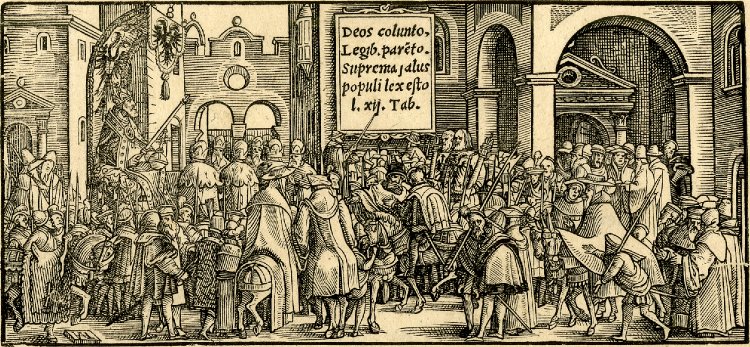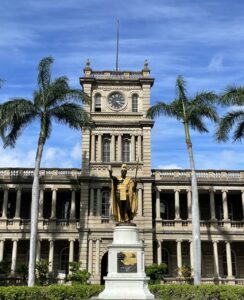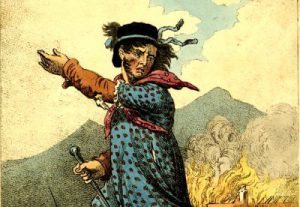In 1517, when the 95 Theses were first posted, Martin Luther had no intention of breaking from the Roman Catholic Church. Rather, he sought to reform the Church’s view on indulgences, believing that no one could buy their way into heaven. Believing that his view was deeply rooted in Scripture, he was confident that Church scholars would agree with him. Instead, the Church hierarchy responded by accusing Luther of heresy, wanting to quell any question of their authority. As a result, what was initially an effort to reform the Catholic faith eventually transformed into a major schism in Christianity itself.

Prior to sparking the Protestant movement, Martin Luther was an Augustinian monk teaching at the University of Wittenberg in Germany. In 1517, Pope Leo X sanctioned indulgences to be sold to raise money for the construction of St. Peter’s Basilica in Rome. An indulgence consisted of money given to the Church in exchange for less time in purgatory, which was conceived as a theological waiting room where imperfect souls were purified after death before they enter heaven. People essentially believed that this meant they could buy a way into heaven for themselves and their loved ones.1 As a result of the Pope’s decree, a Dominican monk, Johann Tetzel, began preaching in favor of these indulgences in the towns of Jüterbog and Zerbst near the university.2 Luther responded to this by writing to the archbishop, admonishing him by asserting that simply paying money to the Church does not purify the soul.
When his protestations went unanswered, Luther posted his 95 Theses. The theses were arguments opposing the manner in which indulgences were being sold.3 Most of the theses did not contradict Catholic doctrine, so it is widely believed that Luther wrote them to spark a theological academic debate. The theses, originally written in Latin, were translated into German and put into wide circulation; this caught the attention of Rome. Fearing that the funding for St. Peter’s Basilica was under threat, Leo ordered Luther to be investigated. In response, Luther sought the support of a Germanic prince, Frederick the Wise. Frederick granted Luther support and protection, insisting that the investigation take place in Germany.4 In response, Leo asked the papal legate in Augsburg, Cardinal Cajetan, to investigate Luther. Brought before Cajetan, Luther was asked to renounce his theses and recant his accusations against the Church. Luther refused, but agreed to stop commenting on indulgences and listen to the Church. Although this was not Cajetan’s desired result, Frederick allowed Luther to return to Wittenberg.5

The following year, 1519, Luther agreed to debate the theologian Johann Eck. Eck instigated the debate by comparing Luther’s positions to Jan Hus, a well-known heretic that had been excommunicated and executed a hundred years earlier. This forced Luther to declare that the Church had been wrong to condemn Hus, opening himself to charges of heresy.6 Eck had given the pope the opportunity to bring excommunication charges against Luther. However, the Holy Roman Emperor Charles V, not wanting to upset Frederick the Wise, forced the pope to subject Luther to a hearing at the Diet of Worms. At this time, Luther’s cause was gaining popularity among Germans. The emperor could not afford to upset the German prince, needing his support to fight an ongoing war with France and keep the Ottoman Empire from Austrian lands.7
During the trial, Luther was led into a room where his accusers had piled his works on a table, read the titles aloud, and asked if these books belonged to Luther. Luther replied that the books belonged to him. He was then asked to renounce them. Luther then asked for time to consider. When he returned the next day he refused to reject anything, saying that unless he was disproved by Scripture, he was bound by his conscience to defend his work.8 He felt that he was strongly supported by the Bible. However, Church officials saw this as a rejection of their authority rather than an appeal to Scripture. Charles V, though angered, could do nothing to condemn Luther as long as he remained at war. Instead, he planned to send Luther back to Wittenberg marked as a heretic.9 However, before he reached the university, Frederick the Wise secretly had Luther taken to Wartburg Castle.10
Throughout the next few years, Luther continued to defend his works. One of his biggest achievement during this time was the translation of the Bible from Latin into German. Still, he was forced to remain hidden. Charles V, after securing an alliance with the pope in the war against France, no longer needed ties with Frederick the Wise. This allowed the papal bull, proclaiming Luther’s excommunication, to be issued, adding a decree which ordered that no one give Luther refuge.11 It was ultimately his refusal to retract his works that prevented Luther from reforming the Church. Pope Leo X, Charles V, and other high Church officials perceived Luther’s passion for reform as a challenge to authority. In contrast, Luther believed that his works were strongly supported in Scripture. The miscommunication and stubbornness of both parties ultimately led to a major schism within Christianity. When the Church labeled him a heretic, Luther had no choice but to begin his own branch of Christianity, Lutheranism, so that he could continue to practice the faith to which he had dedicated his life.
- Renaissance and Reformation Reference Library, July 2002, s.v. “Martin Luther: Founder of Lutheranism” edited by Julie L. Carnegie. ↵
- New Catholic Encyclopedia, September 2003, s.v. “Luther, Martin” by Bill Ditewig. ↵
- Funk and Wagnalls New World Encyclopedia, 2016, s.v. “Luther, Martin” ↵
- Renaissance and Reformation Reference Library, July 2002, s.v. “Martin Luther: Founder of Lutheranism” edited by Julie L. Carnegie. ↵
- New Catholic Encyclopedia, September 2003, s.v. “Luther, Martin” by Bill Ditewig. ↵
- Renaissance and Reformation Reference Library, July 2002, s.v. “Martin Luther: Founder of Lutheranism” edited by Julie L. Carnegie. ↵
- Renaissance and Reformation Reference Library, July 2002, s.v. “Martin Luther: Founder of Lutheranism” edited by Julie L. Carnegie. ↵
- Encyclopedia of World Biography, December 2004, s.v. “Martin Luther,” by Andrea Henderson. ↵
- Julius Koestlin, Life of Luther (Project Gutenberg Literary Archive Foundation, 2006), 105-116. ↵
- Funk and Wagnalls New World Encyclopedia, 2016, s.v. “Luther, Martin” ↵
- Julius Koestlin, Life of Luther (Project Gutenberg Literary Archive Foundation, 2006), 105-116. ↵



94 comments
Melyna Martinez
This article shows Martin Luther’s impact on the reformation and on people’s religious freedom. It is great to see his efforts to show people the imperfectness of religion with the 95 theses, but he also wanted to give people the power to build their own perspectives by translating the bible. It is also so interesting how out of this a whole religious form adapted to the needs and beliefs of a group of people and it started with Martine Luther.
Sofia Perez
Hi Valdez, This was a good article! I have always found the protestant reformation interesting to learn about. Martin Luther created his own form of Christianity, Lutheranism, which was centered around sole fide and sola scrupurta. This translates to by faith and scripture alone, will then you be saved. Something new I learned was that the original Ninty-five thesis was written in Latin.
Ana Diaz
Great article! I think Martin Luther is one of the most important figures for the Catholic reformation, and that he is definitely both a rebel and a reformer. His calling out of the Catholic church’s malpractices was very much needed for the time. I cannot imagine how the church would have evolved if Martin Luther never wrote his 95 theses, or if anyone else would have be rebellious and brave enough to stand up to the powerful entity the church was.
Marie Peterson
After learning about Martin Luther in class it was nice to read an article that gave me some more information. I think this article does a great job starting with Martin Luther’s goals for the 95 Theses and how the misinterpretation of his thoughts turned into the creation of the Protestants. This was not only an interesting read but a useful one as well. Great Job!
Martina Flores Guillen
Restricting someone to believe whatever might seem morally correct to them is, in a personal scope, an abuse of power and misleading within a general sense. The Christian church officials were wrong in believing Luther’s exploration of a newly developed religious objective was a sign of rebelliousness against the church and unacceptable. Why couldn’t that be acceptable? Under what humanitarian and religious concept would such an act of natural curiosity be unethical to question such power corruptive religious system?
Noelia Torres Guillen
I really enjoyed this article! Luther did not agree with most things the church did/followed especially indulgences. Why do you have to pay in order to be let into heaven? The more money you give the less time you spend in purgatory. Luther only agreed with scripture and that we should follow scripture. Those who didn’t want the church to be reformed took Luthers ninety five theses as an act of rebellion. But to me rebel and reformer seem the same to me. Rebel is seen as a negative thing but at the end they are challenging systems that they believe to be unfair. And reformer are changing things for the better.
Jacob Salinas
This was a very interesting read. Originally, Martin Luther posted the ninety five theses in hopes it would reform some changes in the Catholic church. It in fact did the opposite. He began to lead a movement called the Protestant movement. We recently talked about Martin Luther and Protestantism in class and it was nice to read more about it and gain some extra knowledge.
Alanna Hernandez
The issues Martin Luther had with the Catholic Church is something many Catholics even today have trouble justifying. Thankfully for what he has pushed for and the change he has caused gave those doubtful Catholics the space to have those questions without worrying about the church coming after them as well as being able to create other denominations later on.
Lorena Martinez Canavati
I think this was a very informative article. Before reading this, I knew a little about Martin Luther because we discussed it in class, but this helped me understand him and how a new religion came to be. I can relate to Martin Luther because there are things about the Catholic church that I cannot really understand, so it has given me more insight into Protestantism. I didn’t know Frederick the Great gave him refuge, I guess there was something in it for him.
Eugenio Gonzalez
I like how the article gives a brief introduction to Martin Luther. Martin Luther was able to cause a reform in Christianity unintentionally, and his influence can still be seen in our current time. Another thing that I enjoyed about the article was that it began with 95 theses. It was interesting to know that Martin Luther translated the Bible from Latin to German. Overall, the article was interesting and informative.